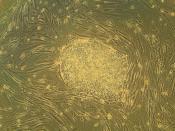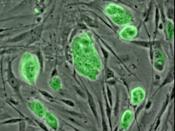Scientist are now able to clone human embryos. There are basically two ways to look at this issue: as a medical procedure with the potential to save and create lives or as medical experiments on developing human beings that may harm or end their lives. Cloning, whether for therapeutic or reproductive reasons is a very controversial and complex issue.
Scientist in favor of allowing the cloning of human embryos argue that is a new source of stem cells that could be used to treat previously untreatable diseases. Stem cells are master cells that have the potential to turn into any type of cell in the body. Theoretically, if the persons own DNA was used to make an embryo, stem cells could be extracted and used to grow whatever cells or tissues a person might need, even whole organs. Those against allowing the cloning argue that it is unethical to create human embryos for the sole purpose of killing them and harvesting their cells.
Scientist also argue that cloning techniques are essential to the production of breakthrough medicines. A ban on cloning would limit access to possible life savings products. In the past the only way to get embryos for stem cell research was from abandoned eggs at fertility clinics. The supply of embryos for stem cell research is very limited. If scientist were allowed to clone human embryos for they would have a never-ending supply. President Bush passes a law that the federal government will continue to fund stem cell research but only if the stem cells were produced before August 9, 2001. This raises the question of why it ethical to use stem cells made from human embryos before August 9th but not after? It will take years to find out whether it is possible to use stem cells...


